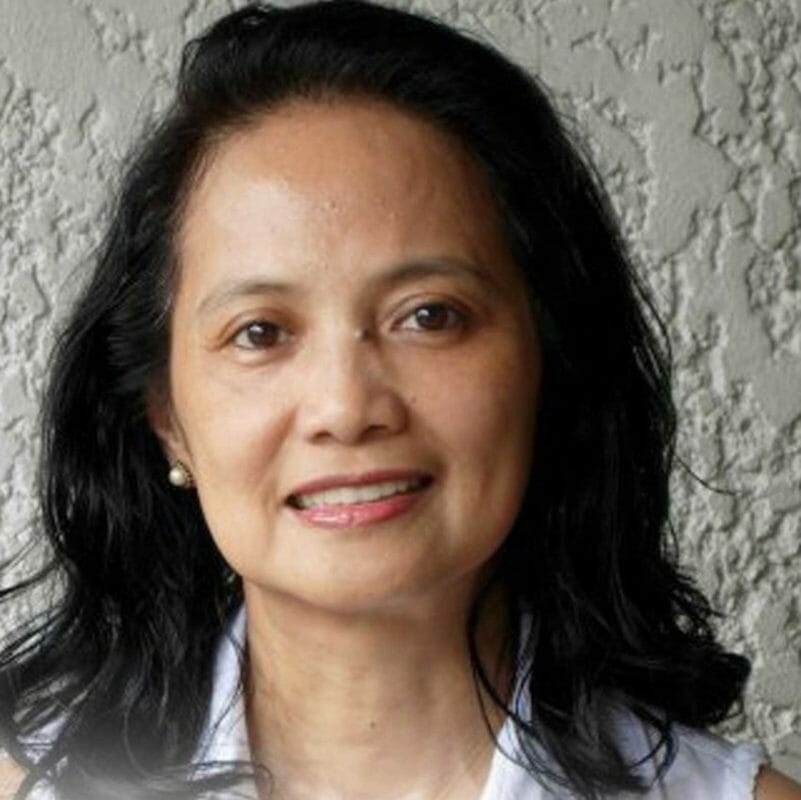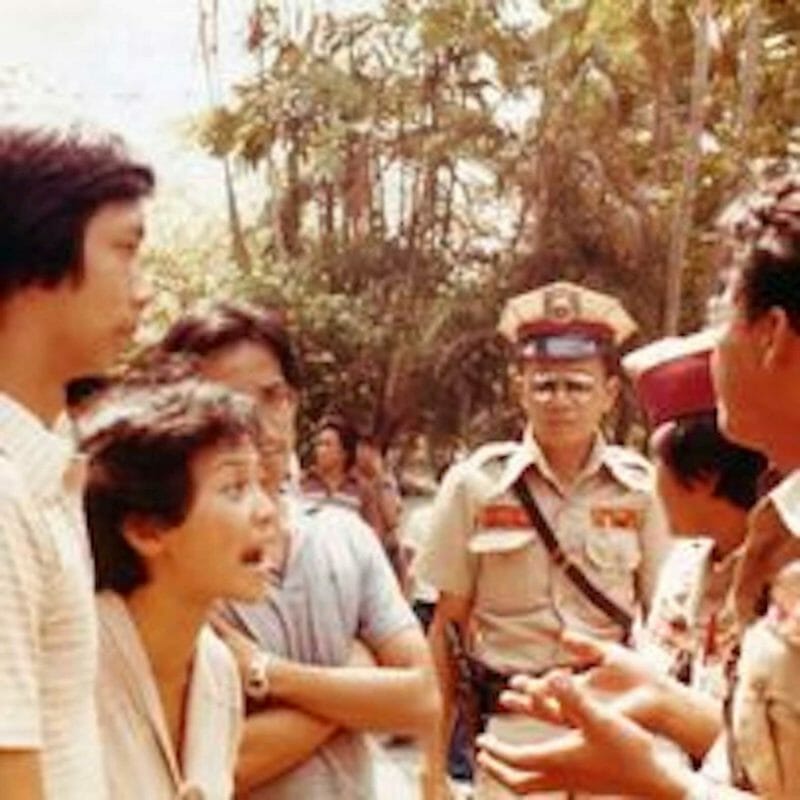
Lisa Dacanay, founding president of the Institute for Social Entrepreneurship in Asia, CONTRIBUTED
(5th in a series of profiles of Martial Law Babies as we prepare to mark the 50th anniversary of the martial law declaration in September. This is the generation Marcos tried and failed to mold into his version of the Hitler Youth. They fought his dictatorship instead.)
What it really means to fight against a dictatorship hit home for Lisa Dacanay when she suddenly had to make a run for it while walking on the UP campus.
This was in 1980 at the height of Marcos’s power. Lisa was a 21-year-old student leader on a campus reeling from yet another police crackdown. While walking on the academic oval accompanied by members of a fraternity alliance assigned to protect her, policemen in a car pulled up suddenly and tried to arrest her.
“Lisa, run!” one of the fraternity members yelled. And she did. She ran into the College of Education and eventually made it to Palma Hall where two revered university deans, Francisco Dodong Nemenzo and Oscar Evangelista, protected her from the arresting officers.
Lisa now recalls the incident with amusement. “Naka-high heels ako noon. I was in high heels,” she recalled on a recent video chat, laughing. “I took off my heels and ran.”
But the scary encounter was a turning point for her, when she understood the deeper meaning of being an activist. “The first thing that came to mind when I was running was: This is a life and death struggle,” she said.
“Tumapang ako. I felt more courage. I was willing to give my life. It became very real to me that this was serious. It’s something that you really have to give up your life and your dreams to fight for democracy. It was really face to face with the repression, the dictatorship.
“Hindi na siya simpleng student rights and welfare. It was no longer just a fight for student rights and welfare.”
The fight for student rights
Student rights initially was the focus of Lisa activism.
The Marcos regime had cracked down hard on campuses. Student councils and student papers were banned. At UP, the Philippine Collegian survived, but its staffers were routinely harassed.
By the time she entered UP in 1976, the campus was still under siege. In 1977, its editor-in-chief Ditto Sarmiento died after being imprisoned by the regime.
But students were fighting back, and in many cases, winning. In 1980, they won the right to hold the first university student council elections.

A young Lisa Dacanay confronting policemen. CONTRIBUTED
Activism had actually not been part of Lisa’s plans. “I was from a middle class family and what I wanted to do was to graduate, become rich and help the family. That was the little dream I had when I entered U.P. But I got involved in activism — so my dream of becoming rich changed.”
The fight for student rights reached a critical point at a major demonstration in Arroceros which was violently dispersed by police. Lisa witnessed the beatings. “Maraming napukpok na mga estudyante. Many students were truncheoned. That’s when I realized that we were fighting a dangerous battle with the state and that I was willing to make my own sacrifices.”
What began as an intellectual acceptance of that commitment turned into something deeper after her encounter with the police on the UP campus. ”That’s when I became a true blue activist who was ready to fight.”
A different activist realm
But activism is more complicated than the fight for student rights, and being ready to go head-to-head with a ruthless regime.
We all realized this eventually. I got to know Lisa as in the final years of the regime when we became exposed to the dogmatic tit-for-tat and debates over the best path to removing the dictatorship — and what should replace it.
“I remember the euphoria and the celebration,” Lisa said of the days when the dictatorship was finally overthrown.
After the end of the dictatorship, her activism evolved. The focus shifted from protesting to how one can actually make a difference in the lives of people and their communities.
That was when Lisa immersed herself in a different realm of activism, one that sought to effect change at all levels, from the national to the barangay. That’s when she began using new phrases and advocating for new concepts — sustainable development, alternative development, people’s empowerment.
“Hahanap ka kung saan magkakaroon ng impact. You look for ways to have an impact,” she told me.
In Bataan, her organization, the Philippine Rural Reconstruction Movement, helped local residents, including fisherfolk, organize a coalition to manage coastal resources. And they did this by working with local governments. The campaign scored key victories — from combating illegal fishing to restoring municipal fishing grounds. These were not high-profile victories — but they were meaningful and important to the lives of people in Bataan.
Lisa’s involvement has extended beyond the Philippines. Lisa became the founding president of the Institute for Social Entrepreneurship in Asia, which is pushing for grassroots-led development programs.
In 2019, she received the Social Innovation Thought Leader Award from the Schwab Foundation for Social Entrepreneurship. The award was presented at a World Economic Forum summit.
“Much has been said about the need for government to lift the poor, and very little about the poor themselves charting their own path to progress, so they may rise from poverty and want, by their own labor and resolve,” she wrote in an article explaining social entrepreneurship.
Activism is about building alternatives
It’s been an uphill battle. But over the past three decades, she has seen and helped lead “little success stories,” she told me.
The successes were based on a key principle activism: helping people, especially those who have been marginalized in society, realize their own power to the point when they wouldn’t need activists to fight for change.
There are new challenges now, of course. The rise of a new authoritarianism under Duterte makes pushing for these changes harder and even more dangerous.
The fact that the country is sliding back into a time of fear and ruthless leadership is disturbing for those of us who lived through and were part of the fight against the Marcos dictatorship.
But Lisa makes an important point which actually gave me hope — and should give others hope.
They have not received much attention, and many of them may be small in scale, but these “little success stories” have been adding up.
The meaning of an alternative has really become clearer, she said. It is no longer just an abstract idea. More than three decades after the fall of the dictatorship, we can point to “pockets of success” that prove that there is another way for communities to become more empowered.
“Ganoon na ka rich ang karanasan. The experience of building this alternative has become rich on the question of what alternative are we presenting.”
“Mas malinaw na ngayon na, it is clearer now that if you want to work for an alternative society, you need to not only be a fighter — you also have to build that alternative.”
“That’s why I’m passionate about what I’m doing,” Lisa said.

